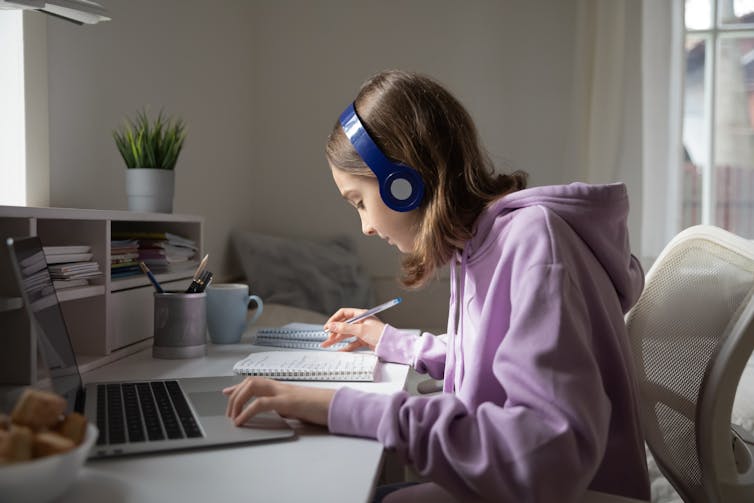England’s planned school reform is just more of the same – innovation expert proposes radical alternative


The educational landscape needs overhauling in England. The school system is based on a 20th century framework that is no longer relevant in an increasingly digital world. Now, after school closures and the disruption caused by the pandemic, is the time for reform. We have a unique opportunity for transformation.
The government’s schools white paper is its response to this challenge.
It proposes a 32.5 hour school week that will add ten minutes to some secondary school days, though many are already meeting this target. There are higher targets for students in core subjects, and a focus on tracking attendance.
There is a parent pledge for children’s outcomes in key skills, and more teacher training. The government continues its focus on academies, providing funding to encourage multi-academy trusts to move into new “education investment areas”.
Overall, the white paper feels more like a continuation of current policy rather than a vision as to how schooling and learning could be developed. Although it does promise high speed broadband for all schools and the provision of online resources, it does not focus enough on what has happened during the last couple of years or how digital technologies could truly transform schools.
Learning from school closures
The loss of traditional face to face teaching and the development of predominately online alternatives during the pandemic was a profound challenge for teachers.
By the second lockdown in England, however, there was a general embrace of technology by teachers. It was used to communicate and collaborate with pupils, and to engage them in their learning. Teachers’ increasing expertise in effectively using chat rooms and other online learning features is well documented.

fizkes/Shutterstock
The school closures also provided a unique opportunity to assess the efficacy of what had preceded lockdown. It made the limitations of the current national curriculum clear, in particular its narrow content. Educators were being asked to create real-time or recorded materials for young people to access at home. However, there was little connection between the various subject elements being studied.
In addition, it highlighted the challenges some learners faced in accessing and engaging with online lessons in different subjects day after day.
Crucially, children’s access to technology varied, and online learning served to exacerbate the “digital divide” between pupils from richer and poorer backgrounds. This will remain a problem and must be addressed.
Read more:
How lockdown highlighted educational inequality in Ireland – new research
A radical approach to education reform would see online learning fully integrated into the school system. This would allow pupils to learn more easily, collaborate, and work on areas they need to concentrate on most. Tech access for disadvantaged children would be prioritised, to help to prepare pupils for their future in an increasingly digital world.
This links with the idea of flexible schooling, where pupils spend some time in school and some learning at home. This allows children to follow their interests and needs while also keeping touch with school structure. Schools provide opportunities for meeting spaces for learners as well as specialist advice, pastoral support, and gaining qualifications. Research has indicated positive academic results from such flexible learning.
Focus on interests
Imagine a system where knowledge was freely available and learners could follow their own interests, with a more personalised curriculum. Students would be assessed continuously, in ways that more effectively reflected and accurately captured their learning.
The assessment process needs to be significantly overhauled for it to be suitable for young people finding their place in a world that requires more skills than those demonstrated by a written exam. A mix of spoken, practical, online, coursework and controlled assessment would be better. Work by UNESCO points to the comprehensive nature of continuous assessment, which allows a more rounded picture of a student’s varied abilities and can encompass aspects such as perseverance and collaboration.
Schools should also be able to link with businesses and other organisations in order to focus on skills – green energy, the creative industries, manufacturing, food, and hospitality, for instance.
The curriculum needs to be reviewed to broaden out its content. The new curriculum for Wales is proactive in this approach. It has six areas of learning and three cross curriculum themes. These help learners to develop wider skills like critical thinking and problem solving, planning and organisation and creativity.
We also need to provide opportunities to link subjects together in a way that connects traditional subject disciplines and mirrors how we actually learn. This is known as providing transdisciplinary learning opportunities, which engages pupils and gives them the opportunity to pursue their personal interests and aspirations. This approach allows for greater collaboration and personalisation, and broadens learning outcomes across subjects.
For example, a unit studying the history of the Troubles in Northern Ireland could be supported by Seamus Heaney’s poetry in English, protest murals in art, and Irish folk music. Pupils could show their understanding of the unit through a choice of art, digital media, drama, music presentations and writing.
Above all, the skills that teachers and learners have developed through remote learning should be preserved and built upon in a re-imagining of education.
![]()
Sarah Younie is a member of the Fabian Society.
Christopher Harris, a teacher researcher, contributed to this article.
